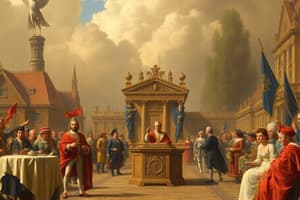Podcast
Questions and Answers
How did the exemption from taxation for the First and Second Estates contribute to the French Revolution?
How did the exemption from taxation for the First and Second Estates contribute to the French Revolution?
- It created a system where the Third Estate bore a disproportionate tax burden, leading to economic hardship and resentment. (correct)
- It ensured a stable financial base for the government, preventing economic crises and maintaining social order.
- It encouraged the Third Estate to pursue careers in the clergy and nobility, easing social tensions and promoting equality.
- It allowed the monarchy to fund public works, improving living standards and reducing unrest among the Third Estate.
Why was the execution of King Louis XVI a pivotal moment in the French Revolution?
Why was the execution of King Louis XVI a pivotal moment in the French Revolution?
- It signified the end of the Reign of Terror and the restoration of order under a constitutional monarchy.
- It triggered immediate international recognition of the new French Republic, securing its borders and trade relations.
- It led to a peaceful resolution of the conflict between the monarchy and the Third Estate, ensuring a smooth transition to democracy
- It demonstrated the revolutionaries' commitment to abolishing the monarchy and establishing a republic based on popular sovereignty. (correct)
How did the Reign of Terror impact the course of the French Revolution?
How did the Reign of Terror impact the course of the French Revolution?
- It led to widespread fear and repression, undermining the revolution's ideals even as it eliminated opposition and consolidated revolutionary control. (correct)
- It solidified the power of the monarchy and suppressed any further attempts at revolution.
- It fostered a sense of unity and reconciliation among the different estates, leading to a more stable society.
- It established lasting democratic institutions and guaranteed individual rights for all citizens.
What role did the Estates-General play in the unfolding of the French Revolution?
What role did the Estates-General play in the unfolding of the French Revolution?
Which of the following best describes the long-term impact of the French Revolution on France?
Which of the following best describes the long-term impact of the French Revolution on France?
How did the social structure of pre-revolutionary France contribute to the widespread discontent?
How did the social structure of pre-revolutionary France contribute to the widespread discontent?
What was the significance of the principles of "liberty, equality, and fraternity" in the French Revolution?
What was the significance of the principles of "liberty, equality, and fraternity" in the French Revolution?
How did the French Revolution influence other parts of the world?
How did the French Revolution influence other parts of the world?
Flashcards
The Three Estates
The Three Estates
The social classes in pre-revolutionary France: clergy, nobility, and commoners.
Taille
Taille
A land tax that heavily burdened the common people in France before the revolution.
Estates General
Estates General
A legislative body representing the three estates, convened by King Louis XVI in 1789.
Reign of Terror
Reign of Terror
Signup and view all the flashcards
Execution of King Louis XVI
Execution of King Louis XVI
Signup and view all the flashcards
Living Conditions Before the Revolution
Living Conditions Before the Revolution
Signup and view all the flashcards
Consequences of the Revolution
Consequences of the Revolution
Signup and view all the flashcards
Political and Social Changes
Political and Social Changes
Signup and view all the flashcards
Study Notes
The French Revolution: Causes, Events, and Consequences
- The French Revolution was a significant period of social and political change in France. It challenged the existing order and aimed for a fairer society.
The Three Estates
-
French society was divided into three estates:
- First Estate: Clergy (Church members)
- Second Estate: Nobility
- Third Estate: Peasants and commoners (vast majority)
-
The First and Second estates had privileges, including exemption from most taxes.
Taxation and Unrest
- Heavy taxation, particularly the land tax (Taille), burdened the Third Estate.
- This growing dissatisfaction fueled unrest as people desired reforms and fair treatment.
The Estates General
- A representative body (Estates General) comprising delegates from all three estates was convened by King Louis XVI in 1789.
- This was called to address France's economic crisis.
Causes of the French Revolution
- Bad harvests and rising prices: Food shortages and rising bread prices led to widespread hardship
- Desire for social change: The Third Estate sought equality and an end to the privileges of the nobility and clergy.
Events of the French Revolution
(Further details below)
The Reign of Terror
- The Jacobins, a radical group, seized power and instituted a violent period called the Reign of Terror.
- Severe punishment was given to those who opposed the revolution.
Execution of King Louis XVI
- King Louis XVI was executed in January 1793 for treason, after attempting to escape and regain power.
Living Conditions Before the Revolution
- A large disparity existed between the estates.
- Nobility and clergy enjoyed privileges and exemptions from taxes.
- Common people faced heavy financial burdens and social inequality.
Consequences of the Revolution
- The French Revolution led to the rise of Napoleon Bonaparte.
- It resulted in the end of the monarchy and the establishment of new principles like liberty, equality, and fraternity.
- It profoundly reshaped the political and social landscape of France and inspired other movements globally.
Studying That Suits You
Use AI to generate personalized quizzes and flashcards to suit your learning preferences.
Related Documents
Description
Explore the French Revolution, a period of major social upheaval. Learn about the three estates, the heavy taxation, and the Estates General convened by King Louis XVI to address France's economic crisis. Understand the causes and consequences of this pivotal moment in history.





